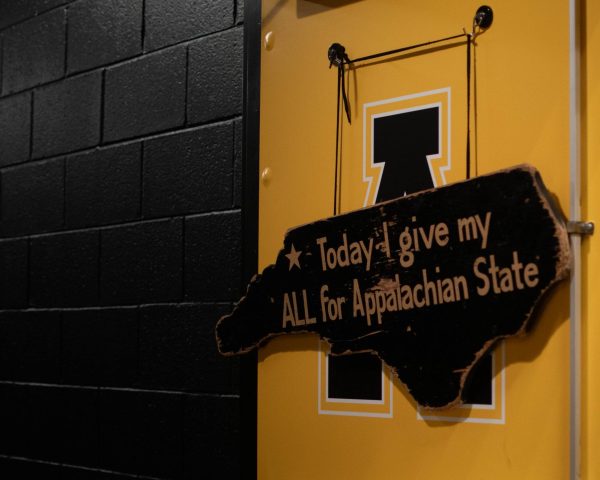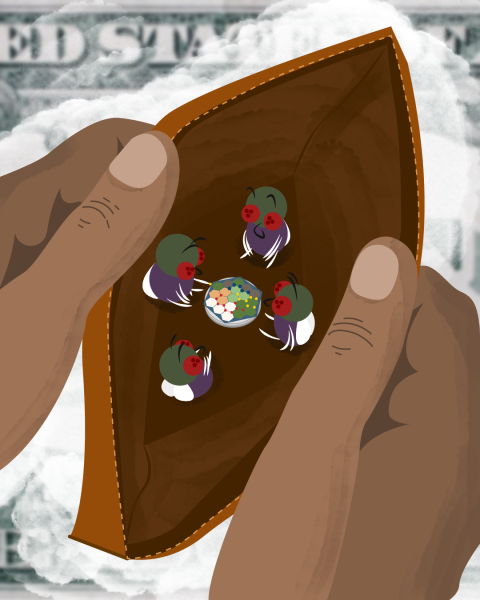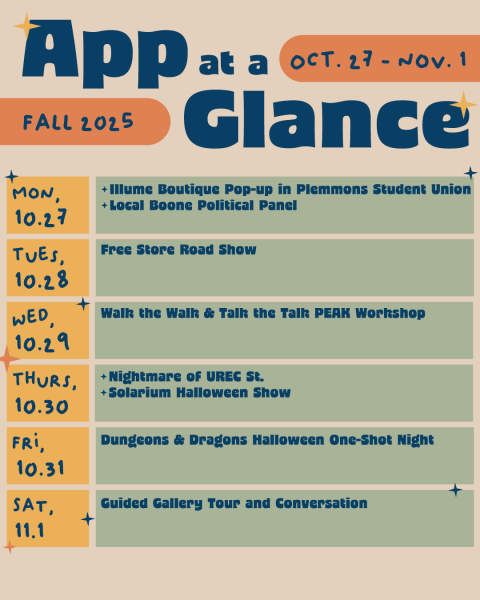Through Ella’s Eyes: Boone needs sustainable tourism
October 10, 2022
Temperatures and leaves are finally dropping. Fall has arrived in the High Country. From corn mazes to pumpkin patches to hiking and haunted houses, tourists from all over are coming to Boone to experience an Appalachian autumn. Enthusiastic leaf peepers and weekend trippers flood the area for fall festivities, but what does that mean for Boone locals and the beautiful environment so many come to see? Fall is certainly a peak season for tourism, but it isn’t all pumpkin patches and apple picking.
Unfortunately for Boone, tourism and entitlement go hand in hand. Unrestricted tourism contributes to environmental damage, pricey housing and mass commercialization. Policies encouraging sustainable tourism are essential to empower locals, protect the environment and keep Boone authentic. Not much can be done to stop entitlement, but regulations can be put in place to curb the negative effects of mass tourism.
Southern Appalachia has a long history with tourism. Beginning in the early 1800s, mountain air and water were seen as therapeutic for people suffering from various ailments, including arthritis and tuberculosis. During the Industrial Revolution, mountain retreats were a luxury, as only the rich could afford to escape the city and experience nature. Tourism became more accessible and affordable moving into the 20th century with the establishment of Great Smoky Mountains National Park in 1926 and the continued construction of the Blue Ridge Parkway throughout the 1940’s and ‘50s. Traveling for pleasure used to be a privilege only for the elite. Today, the High Country is very accessible within only a few hours drive from North Carolina’s three biggest cities, Charlotte, Raleigh and Greensboro. It’s great that more people can afford a mountain vacation but with more people always comes more problems. Tourism is an important industry for Boone’s economy, but it is also harming the very place so many love to visit.
A shared problem across the tourism industry is entitlement. Tourists often feel a sense of ownership over the places they visit. Although they pay to visit, it does not excuse bad behavior, dismissal of the local community’s rules or disrespect of public spaces. One of the more prominent issues facing the High Country’s environment is entitled visitors not obeying the rules while on hiking trails and visiting waterfalls. The ecosystems in and around Boone are often fragile alpine environments, sensitive to human activity and interference. The influx of tourists into Boone and the surrounding area means more activity on the trails. It’s always good that people want to get outside, but more traffic on the trails means a higher likelihood of visiting hikers going off trail, not putting their dogs on leashes, littering, ignoring safety measures and starting prohibited campfires. The argument could be made that tourists may not know about the rules. However, it is the visitor’s responsibility to ensure they are following regulations and respecting the environment. Using the “I didn’t know” excuse for littering, starting fires and letting dogs run free is an ignorant excuse and completely disrespectful to the environment and community you are a guest in.
Tourists should be mindful of the environment and rules protecting it, but also mindful of where they stay while visiting. It’s no secret that there’s a housing shortage in Boone and rent is through the roof. Many issues contribute to the housing crisis in Boone including the short-term rental industry. Short-term rentals, like Airbnb and Vrbo, are widely used by visitors to the area. Although they are convenient for property owners and tourists alike, they are a major driver of gentrification. Property is quickly purchased by wealthy landlords to market as a short-term rental. Boone residents are left with less housing, worsening the crisis and raising rent prices. The prevalence of short-term rentals in the High Country is hurting especially low-income locals and fueling a parasitic tourism industry. Tourism should be mutually beneficial, not a drain on Boone’s people.
Too often tourists have the expectation that the community they are visiting should accommodate them and exist to make their stay as comfortable and exciting as possible. Although many businesses in Boone accommodate tourists, the town does not solely exist for their visiting pleasure.
Unfortunately, tourism is driving mass commercialization in Boone. Many come to Boone for an Appalachian experience, but oftentimes that experience is neatly packaged into a commercial enterprise. The mountain general store is twisted and commercialized into something like Mast General Store with a location conveniently on King Street, while Appalachian-owned general stores close. Convenience and commodification is killing the very culture tourists come to experience. To be fair, tourism is good for Boone’s economy, but are the benefits really returning to Boone locals? Opportunistic businessmen take advantage of Boone’s tourism industry. Lucrative businesses, like Mast General Store, are now owned by wealthy Floridians. Popular ski destination Sugar Mountain is owned and directed by a family from Austria. The Appalachian experience is commodified by outsiders, with little return to Appalachian people.
Implementing sustainable tourism practices would help counteract the negatives of the industry. Sustainable tourism “takes full account of current and future economic, social and environmental impacts, addressing the needs of visitors, the industry, the environment and host communities,” according to the United Nations World Tourism Organization. So what does sustainable tourism look like in Boone? To start, stricter regulations on short-term rentals, like those seen in Asheville. Enforcing rules on hiking trails more strictly. Encouraging shopping from local, Appalachian-owned businesses. Tourism is a critical industry to Boone’s economy. It isn’t going anywhere and it shouldn’t. It’s not a bad thing, but it can easily get out of control. Tourism should be mutually beneficial to Boone and visitors alike, not a drain on the community and pricing out local people. Putting a few more guidelines and rules in place may seem like an inconvenience but it’s essential to protect our town from exploitation. Boone needs sustainable tourism.














Terry Waldspurger • Oct 12, 2022 at 7:45 am
Thank you for your opinions, Ella. As a resident of Howards Knob Road near Howards Knob Park, I have seen first hand how the irresponsible and greedy growth of tourism can negatively affect the natural beauty and serenity of our area. Specifically, the Tourism Development Authority, a non-elected group of locals all having roots in the county tourism industry (and none with a specific background in botany, ecology, geology, sustainability, or conservation), is in the process of approving a major upgrade to Howards Knob Park, the total cost of which may ultimately run over two million dollars. Not only has the TDA not answered the local community’s pertinent questions of exactly how the current natural state of the park will be affected by their proposed “improvements,” it cannot provide one specific detail outlining how many trees, plants, boulders, etc. will be cut, blasted, or otherwise destroyed for the sake of potential profits which would line the pockets of the members of the TDA itself. Indeed, Mr. Wright Tilley, the executive director of the Watauga TDA, has recently stated that “the park belongs to the county and we will do whatever we want with it.” Forgive me, but don’t the taxpaying residents of Watauga County have any say in how their community is developed? In 2019, a petition was circulated that quickly amassed over 700 signatures from residents voicing their concerns over cutting any trees or destroying any other natural elements in the park — yet our voices have continued to fall on deaf ears for the sake of profits. Community members and the park itself will be the ultimate victims here. Tourism development marches on — but at what cost? Please feel free to contact me if you want to follow up on this ongoing debate.
someguyrighthere • Oct 10, 2022 at 1:26 pm
Ella- please do some more research before you lambast Mast General Store. The Cooper family has owned Mast for over 40 years. Yes, they moved from Florida- but I think the way you’ve worded it: ‘now owned by wealthy Floridians’ is very negative and misleading. John and Faye are some of the most kind and philanthropic folks I have ever met. The Boone location has been there for over 20 years. It is unfortunate that the Tomato Shack had to close but that is due to construction on 105 and has nothing to do with Mast. Same thing goes for Sugar Mountain- the Jochl family has run Sugar for over 40 years. Gunther worked for Sugar for 30+ years before purchasing. Instead of throwing untrue accusations around, try doing some digging on the subjects you write about and give honest facts instead of your skewed opinions.
Nicky D • Oct 11, 2022 at 4:15 pm
You obviously didn’t have your rent doubled when stay at home mom and investor husband from South Carolina bought the house you had rented for 3 years… This is the general trend – owning cheap property in NC, exploiting the land, the workers, the college students, and the town, all while sending that money back to Florida or Austria or wherever, to sit in a bank or get blown up someone’s nose. No reinvesting and meanwhile our rivers are at the lowest levels ever cause we’re pumping water up to mountain mansions, electric bills increase to pay for the infrastructure to build to mountaintop communities. Lights run year round for a house only used for a couple holiday trips. It’s disgusting. Get real.
SS • Oct 12, 2022 at 10:46 am
Agreed, more research is necessary, Ella. Going to the website of a business and reading that the owner originated somewhere other than Boone is not enough to cause you to single out a business for this kind of negative attack. The Coopers have always been actively involved in the local community, both in Valle Crucis and in Boone. Their family and The Mast Store has historically led the way in financial support and sponsorship for environmental and conservation non-profits in the area for over 40 years – over twice as long as you have even been alive! (Pay a visit sometime to the Valle Crucis Community Park, which they have enriched that community with.) They have also led the way in support for the local arts scene, including the refurbishment of the Appalachian Theater. In fact, I would say they have written the book on how to successfully develop a profitable business while staying connected with, and giving back to, the local community. They are well-known as tireless volunteers in local organizations, and have raised their family here, making The Mast Store a second generation business, all the while celebrating and being respectful of the history of the store and the area. All of this is well-documented in numerous articles that you could have found had you done the research. (The article in Our State magazine, which tells of how these “wealthy Floridians” lived in the attic of the original Mast Store while renovating it, is well worth a read.) The same can be said for Sugar Mountain and its ownership. You make some relevant points about short-term rental properties, which is a problem in many areas where tourism is a major source of income. Housing is definitely a problem. But, that is no excuse to bash businesses and business owners who have always worked to make this a better place to live. You obviously have enjoyed the benefits of our beautiful area since coming here from Waxhaw. I hope you continue to do so during your time in Boone, without spreading such unwarranted negativity about people and businesses who value that just as much as you do.